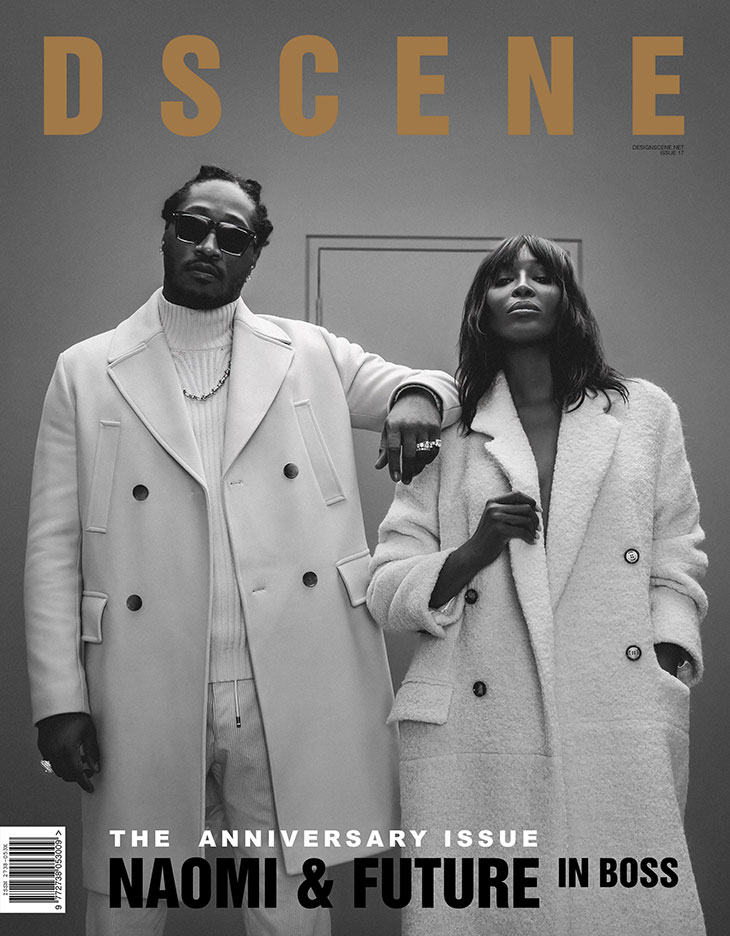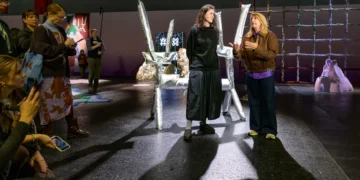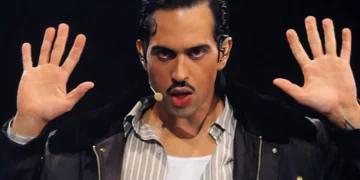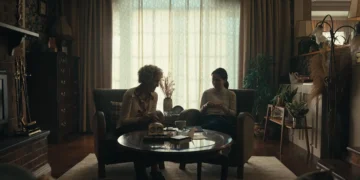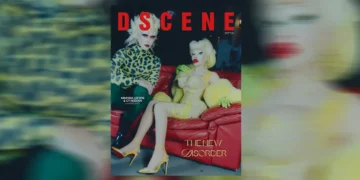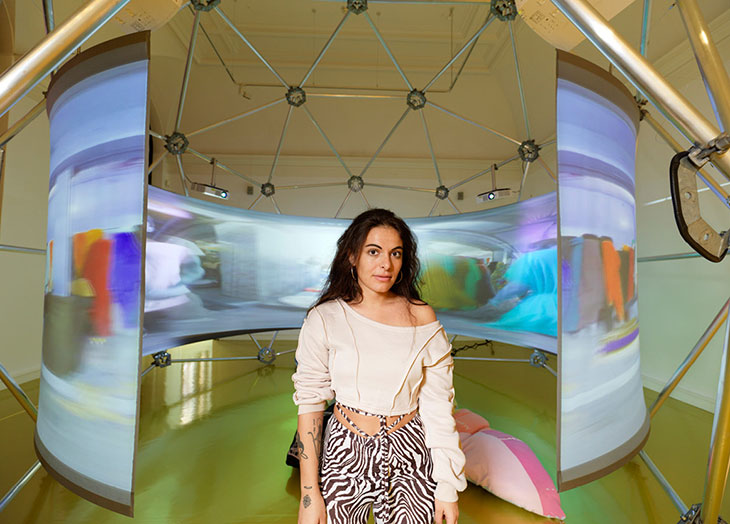
Artist ANNA EHRENSTEIN sits down for an interview with our Editor Katarina Doric to talk about the importance of birthplace, what’s missing in the art world, and her future projects.
PRE-ORDER OUR ANNIVERSARY ISSUE
IN PRINT & DIGITAL

How did you begin working as an artist? Was it a dream, or did it simply happen? – I kind of always wanted to express myself in a creative way. In Kindergarten, I wanted to be a dancer or a fashion designer. In elementary school I wanted to be a singer, and in high school, a visual artist or sociologist. I’m blessed to have an artistic practice now that unites all of these interests. Still, it took a long time to really understand what contemporary art is and what it isn’t. It’s the classic migrant story of a global south art understanding, always “lagging” behind a western art canon.
I was lucky to have a truck driver dad, a pianist mum, and an uncle who was a painter. He ended up in jail during the communist regime in Albania because he painted too abstractly. Since the ’90s, he has been living his best abstract painting life [laughs]. Albanian abstractionism peaked 30 years later than in the West. So I loved creating, but I only could relate to being a visual artist when I realized it’s not all old-men energy. And it took me almost ten years to understand the codes and contexts of the contemporary art world.
Freedom of movement should be a human right, but it is not even the case in the event of war and famine. We are told the internet changed access to everything. And yes, there are a few great examples of democratizing voices through social media or cross-border monetary transactions through crypto. However, if we honestly look at it, we are so frustrated cause the structures don’t change, and global inequality is at its peak.
You have Albanian origins but live in Germany. Do you think the place of birth and residence is vital in today’s world? – Yeah, I very much think so. We live in a global necropolitical visa regime that managed to legalize the slavery system into a border regime. The countries that exploit the global south with their imperialist “development strategies” and corporate extractivism trap the majority of black and brown people in the borders of their impoverished states. Freedom of movement should be a human right, but it is not even the case in the event of war and famine. We are told the internet changed access to everything. And yes, there are a few great examples of democratizing voices through social media or cross-border monetary transactions through crypto. However, if we honestly look at it, we are so frustrated cause the structures don’t change, and global inequality is at its peak. If I had continued living in Albania, I would not have achieved a career as quickly as I have.

Your work Tools for Conviviality questions the benefits of technological innovation. Does technology make our life easier or just faster? – I think it is difficult to generalize. Many products enhance consumer comfort while simultaneously ruining the climate and enacting a panopticon, spying on citizens that don’t have the capacity to read all of these terms and conditions.
I am not a techno pessimist, but our technologies have been growingly used to accumulating power for those already powerful. We need radical change to enable user autonomy and maintain a livable planet.
Do you think that online representation transforms the way people think and produce artwork? – Yes, for sure. Especially for people interested in the arts outside of the western capitals. It gave previously unseen access. You see that in project spaces everywhere and also in how street fashions have changed in the last decade. But then there is also so much noise you have to go through. The algorithms do not have great quality curation but rather go for radicalized and emotionally triggering content. So it flattens the conversation and pushes clickbait art or very didactic ways of visual production.
View this post on Instagram
Your work Tales of Lipstick and Virtue deals with issues of authenticity, gender, class, self-representation, racial prejudices, post-colonialism, authenticity, and pseudo luxury. Does buying a fake Gucci buy status in society? – It depends on how well it’s faked [laughs]. People try to access contexts that have been denied to them, but the global elite works well to guard their status. When the Burberry tartan was copied too much, Burberry removed it from the collections because the elites did not want to be connected with the working class. It only came back when elites celebrated class appropriation and 90’s hip hop, and street style came into fashion again. Intellectual property can act as a neocolonial mechanism, and the “savage” of the 21st century doesn’t wear tribal wear, but he wears visible fakes. That’s how many elites look at the migrant boy with the fake Gucci cap. They read his fake cap as a sign of him being “uncivilized” and not understanding the “rules of taste.”
How did your collaboration with Bogota-based voguing collective House of Tupamaras come about? – I had a DAAD research scholarship for the Universidad Nacional in Bogota and actually applied with a completely different project idea. So I told a Colombian friend of mine that I would be in Colombia for six months, and she said I should really check out her friends. I did, and I was blown away. They are just the sassiest bitches around! The vogueing collective is comprised of people who studied dance and visual art, who are hyper-intelligent, hot as fuck, and with the heart on the right spot. Such a great experience working with the babes.

What socio-political issues do you want to address with Technophallus Tupamaras? – The work is basically about the present-day and near-future dangers of data gaps and the question of what the results of our constructions of knowledge are. The “techno-phallus” links science and technology innovation to male generative power. Technology as a symbolizer of big dick energy can facilitate innovation, but it can also endanger everybody who is rendered as consuming and not producing knowledge. Algorithmic bias is one of the examples. When algorithms use databases with data gaps, those excluded from knowledge suffer. One example was when the Amazon algorithm automatically kicked out all applicants CV’s that had the word “women’s” in it because there was never a successful applicant with the word “women’s” in the database. So we found the absolute solution to the problem—posthuman perreo—giving science and technology iconography a queer femme global south kink.
There is a lot of talk about how it is so hard for straight, white dudes to make it in the arts right now and the visible oppression in the Olympics. But if we look at the actual numbers, they really mirror our global injustices.
What do you think is missing in the art world? – There is a lot of hypocrisy within the arts. The discourse is great, but then the institutions treat their laborers like shit, and some bigger artists employ their people in a sweatshop-like manner. There is a lot of talk about how it is so hard for straight, white dudes to make it in the arts right now and the visible oppression in the Olympics. But if we look at the actual numbers, they really mirror our global injustices. The whole African continent recently solely made 0,4% of sales of the global art market. There is so much to do for equity to not only be a pretty exhibition title but actually be intertwined into it.

What would you be doing if you weren’t an artist? – Maybe social sciences. Maybe I would work at a cat shelter. Maybe as a psychologist or a musician. Maybe I would be a crazy lady reading poems for strangers by the beach and watching too many twerk tutorials on YouTube.
What are you working on right now? – I am just working on a show opening in September at one of my two galleries called Office Impart. The show is called The Balkanization of the Cloud. It is simultaneously a desperate homage to the usage of my geographic region of origin as a pejorative term for fragmentation and a comment on tech colonialism and the relationship between the deep state, deep learning, and nationalism.
Amongst others, I look at phenomena like nation-states being Instagram influencers. I am blessed to work with two very talented artists, Lux Venerea and Jonathan Omer Mizrahi.
Keep up with Anna on Instagram – @annaehrenstein
Originally published in DSCENE Anniversary Issue.
